![3 STEPPING STONES TO LASTING PEACE: The Atlantic Charter / Dumbarton Oaks Proposals / Yalta Conference Communique. by Joseph Franklin D.; Stalin - Paperback - [1945]. - from Blue Mountain Books & Manuscripts, Ltd. (SKU: 94608)](https://covertactionmagazine.com/wp-content/uploads/2022/02/3-stepping-stones-to-lasting-peace-the-atlantic-c.jpeg)
[Source: biblio.com] 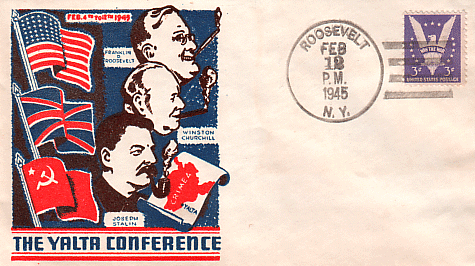
[Source: ronnei.com]
With tensions between the U.S. and Russia at historic levels and threat of a hot war breaking out in Ukraine, we would do well to remember FDR’s visionary leadership and pursuit of diplomacy
Reuters reported last week that the Ukrainian military was carrying out war games with newly delivered American military hardware in preparation for a conflict that could break out at any time.
For years now, the U.S. media has been demonizing Russia, accusing its leader Vladimir Putin of being an iron-fisted dictator who has interfered in U.S. elections, poisoned opponents, and carried out aggression by illegally annexing Crimea.
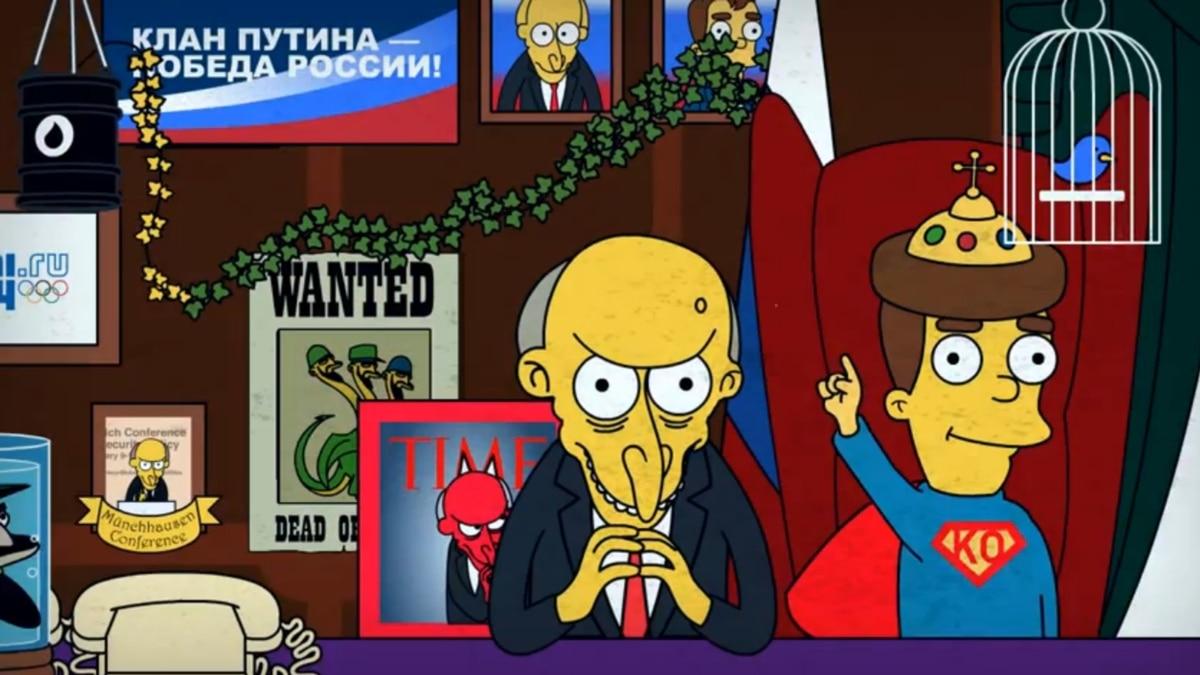
With Russia having amassed over 100,000 troops on Ukraine’s border, the U.S. Congress is prepared to pass a “sanctions bill from hell” whose purpose would be to cripple Russia’s economy.
Mississippi Senator, Roger Wicker, the second highest Republican on the Senate Armed Services Committee, went so far as to suggest in an interview with Fox News that the U.S. should not rule out a preemptive nuclear strike on Russia if it invaded Ukraine.
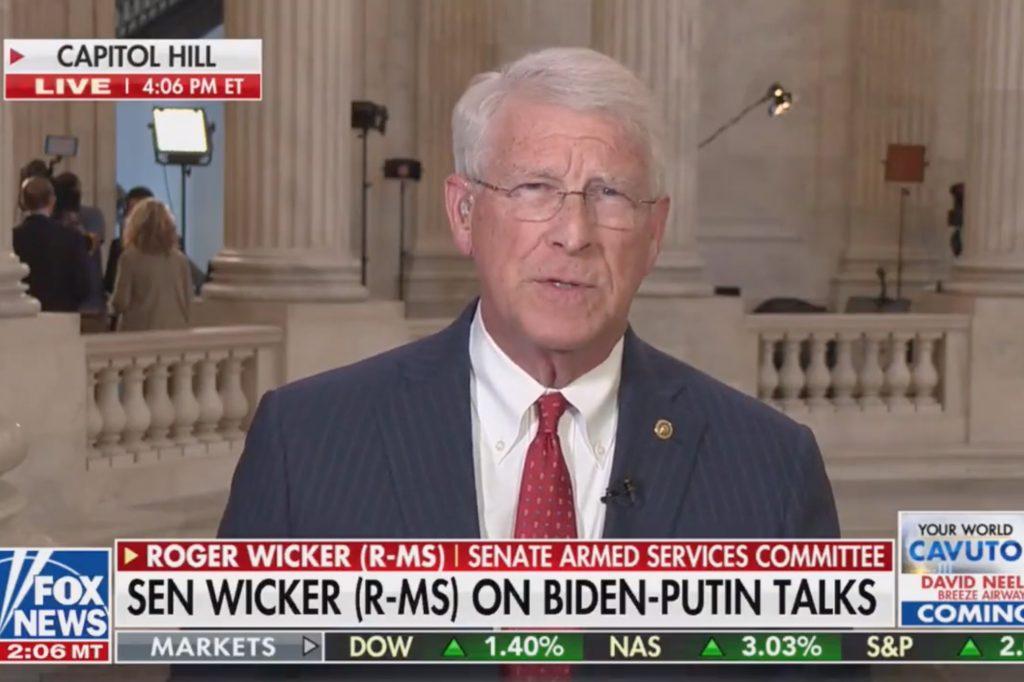
Today’s deeply Russophobic political climate provides an opportune moment to look back to an era of promise in the U.S.-Russian relationship—when U.S. leaders were more sober minded and rationale.
Seventy-seven years ago today, U.S. President Franklin D. Roosevelt brokered a deal with British Prime Minister Winston Churchill and Soviet Premier Joseph Stalin that offers a particular model of diplomatic engagement.
Under the terms of the Yalta agreements, Stalin agreed to enter the war in the Pacific in exchange for the return of Russian territory that had been lost during the Russo-Japanese war.
Stalin further agreed to the division of Germany and to stay out of Greece’s civil war. In return, the U.S. and Great Britain agreed to a Soviet sphere of influence in Eastern Europe to avoid the prospect of Germany ever invading Russia again.
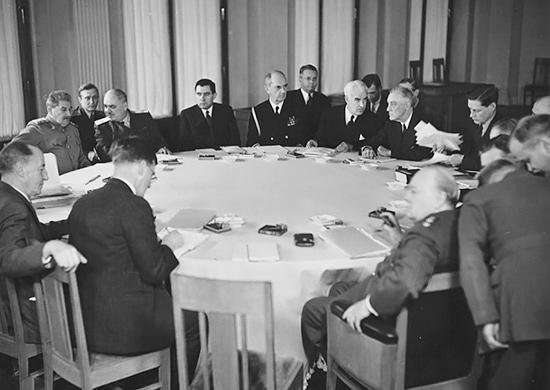
Conservatives have compared FDR’s performance at Yalta to British Prime Minister Neville Chamberlain’s appeasement of Hitler at the Munich conference in September 1938.
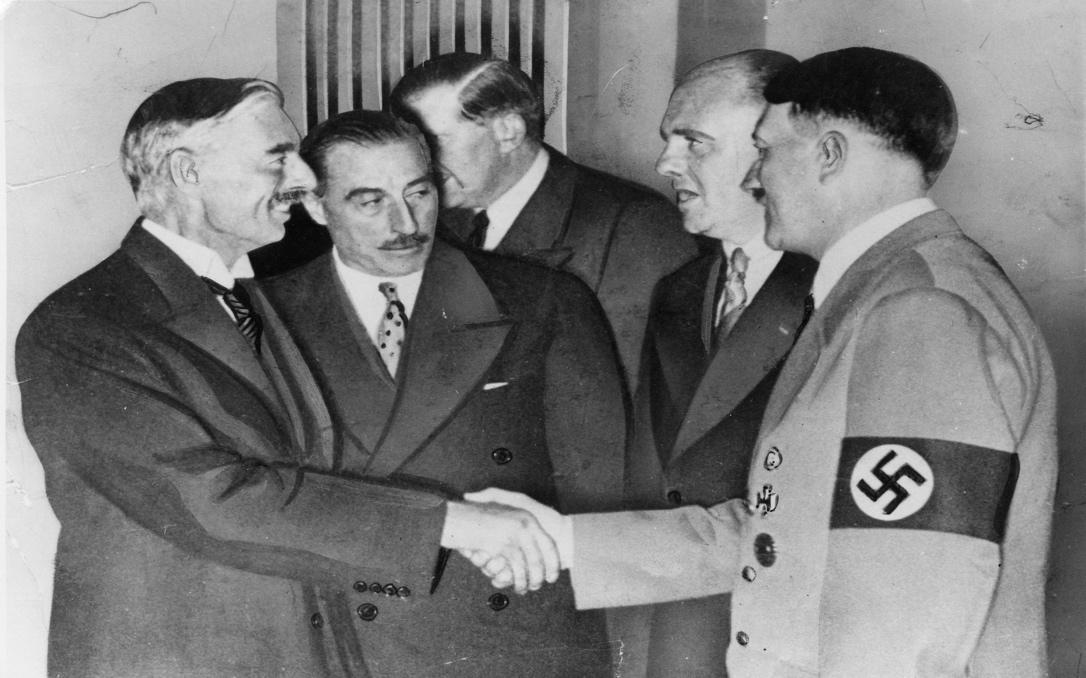
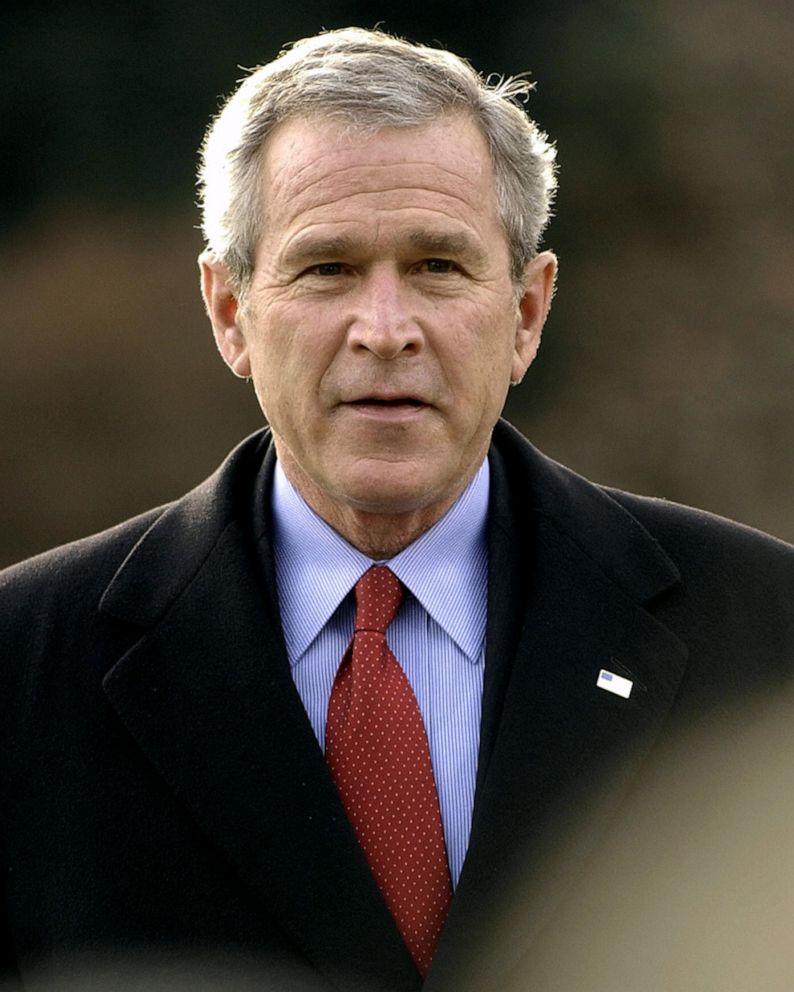
In May 2005, then-U.S. president George W. Bush stated in a speech in Latvia that “the Yalta Agreement followed in the unjust tradition of Munich and the Molotov-Ribbentrop Pact. Once again, when powerful governments negotiated, the freedom of small nations was somehow expendable.”
However, as historian Jacques Pauwels shows in the below account drawn from his book, The Myth of the Good War, Stalin was in fact a pragmatic statesman who made many concessions at Yalta. He agreed to the Allies terms because he legitimately feared a renewed German-Western alliance and replication of the Allied invasion of Russia in 1918-1919 following the Russian civil war.
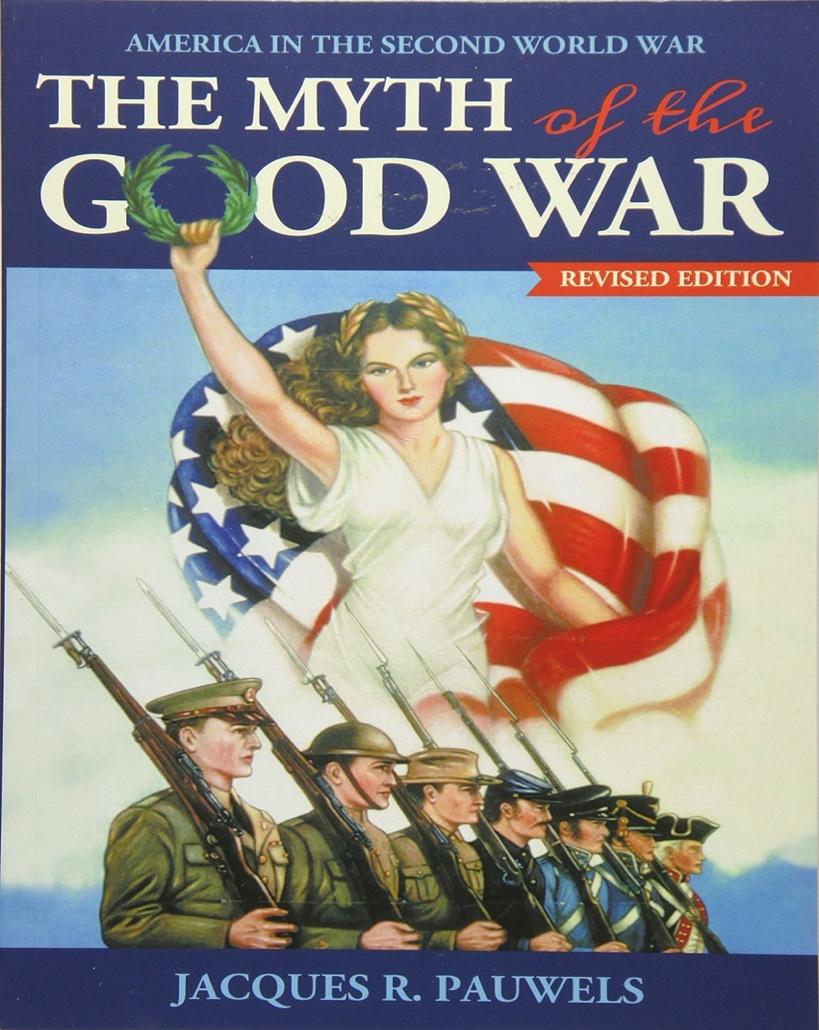
After World War II, the Yalta accords broke down when both Russia and the U.S. violated their terms. FDR’s successor, Harry S. Truman was no longer committed to U.S.-Russia cooperation, having gained power following the purging of Henry Wallace, Roosevelt’s Vice-President from 1940-1944, who had wanted to continue the policy of détente.
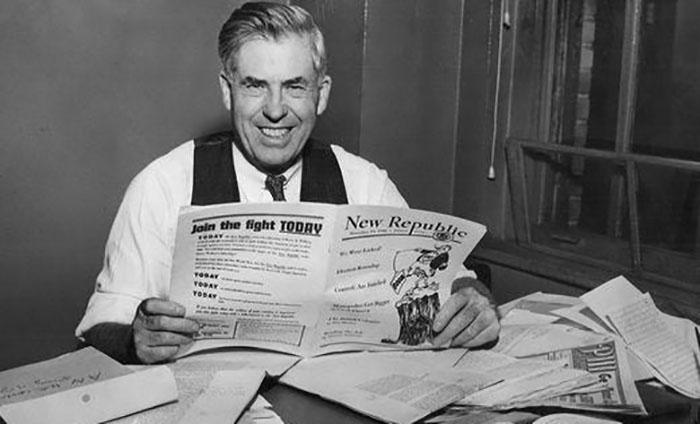
In a history of the Yalta agreements published in 1970, Diane Shaver-Clemens wrote “we are living with the problems of a world that could not benefit from the experience at Yalta. It is perhaps relevant to ask what the world would have been like if the spirit of Yalta had triumphed.”[1]
The same question, I think, is relevant today.
Below is an excerpt from Jacques Pauwels’ book, The Myth of the Good War: America in the Second World War, rev ed. (Toronto: Lorimer Publishers, 2015), dealing with Yalta. Pauwels’ account debunks historical misconceptions and stereotypes that still prevail about Russia today and gives us a model of diplomatic cooperation that hopefully will prevail again.
YALTA, FEBRUARY1945: INDULGING STALIN?
The events of the years 1943 and 1944 in countries such as Italy, Greece, and France had shown all too clearly that it was the liberators who determined how the local fascists were chastised or spared, how democracy was restored, how much input the antifascist resistance movements and the local population in general were permitted in the reconstruction of their own country, and whether political, social, and economic reforms were introduced or not.
In Italy for example, the American and British liberators had sidelined the leftist resistance movement, established a regime (under Marshal Badoglio) that was sarcastically described as “fascism without Mussolini,” and – violating previous inter-allied agreements – had excluded the Soviets from any input into the postwar arrangements for the country.
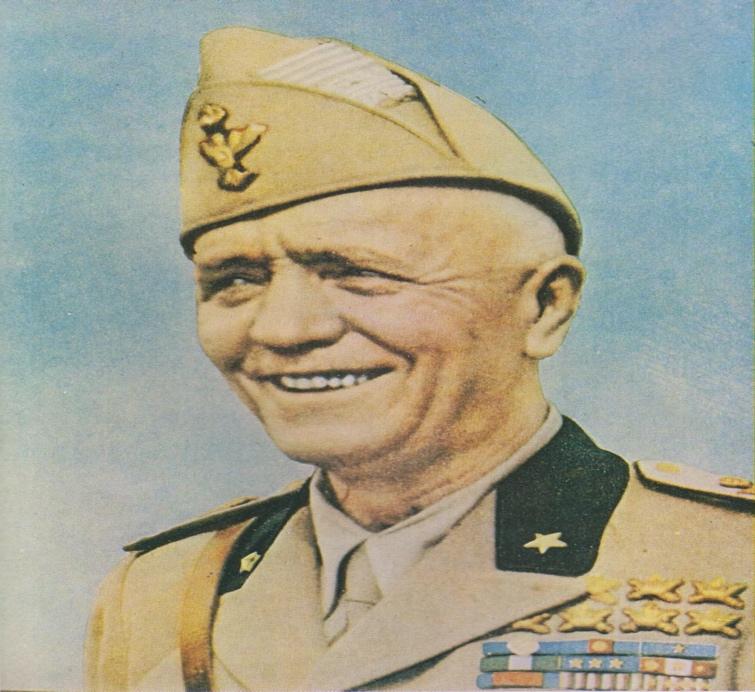
This unsubtle conduct set a fateful precedent: it implicitly gave Stalin carte blanche to proceed similarly in countries in Eastern Europe that were destined to be liberated by the Red Army. However, this symmetry was far from perfect. First, until the summer of 1944 the Soviets continued to fight almost exclusively in their own country. It was only in the fall of that same year that they liberated neighbouring countries such as Romania and Bulgaria, states which could hardly rival Italy and France.
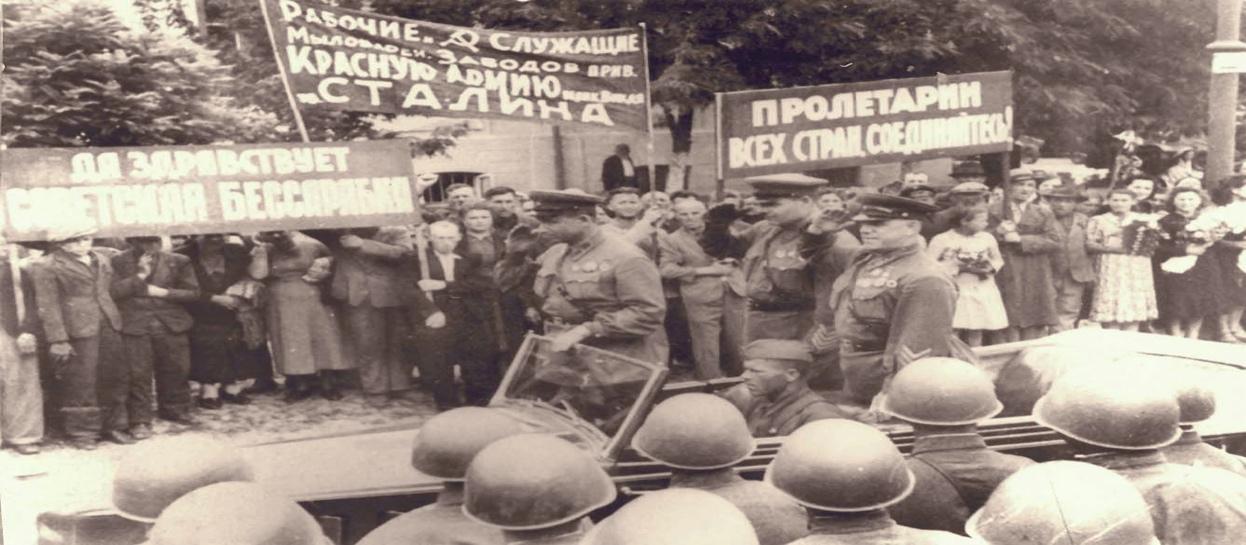
Second, a sphere-of-influence formula agreed upon between Stalin and Churchill (during WC’s visit to Moscow in the fall of 1944.) afforded the Western Allies a small but possibly important percentage of input in some countries of Eastern Europe, which the Soviets did not enjoy anywhere in Western Europe. Regarding their prospects for influence in the post-war reorganization of Europe, then, the situation of the Americans and the British did not look bad at all toward the end of 1944.
And yet, there were also reasons for concern. After the failure of Operation Market Garden, the September 1944 attempt by the American and British to cross the Rhine, it had become obvious that the war in Europe was far from over. A considerable part of the continent still awaited liberation, and Nazi Germany itself had yet to be conquered.
In the meantime, it was evident that Poland would be liberated in its entirety by the Soviets, a prospect that alarmed the conservative and strongly anti-Soviet Polish government-in-exile in London. This government, incidentally, did not consist of devoted democrats, as is too often taken for granted, but represented the autocratic Polish regime of the prewar period, a regime that had connived with Hitler himself and that on the occasion of the Munich Pact had followed his example by pocketing a piece of Czechoslovakia.[2]
Furthermore, by the start of 1945 at the latest it was as good as certain that the prestige of marching victoriously into Berlin would fall to the Red Army, and not to American or British troops. The advance of the British-Americans in the direction of the German capital was first checked in the Netherlands at the time of Operation Market Garden and was strongly impeded again between December 1944 and January 1945 by Field Marshal von Rundstedt’s unexpected counteroffensive in the Ardennes.
The latter episode was destined to enter the American collective consciousness as well as American history books as a gigantic and heroic clash, the Battle of the Bulge, and was celebrated in due course in an eponymous Hollywood production. In reality, however, the confrontation in the Ardennes represented a serious setback for the Americans. Von Rundstedt’s counteroffensive did eventually end in failure, but initially the German pressure was considerable.
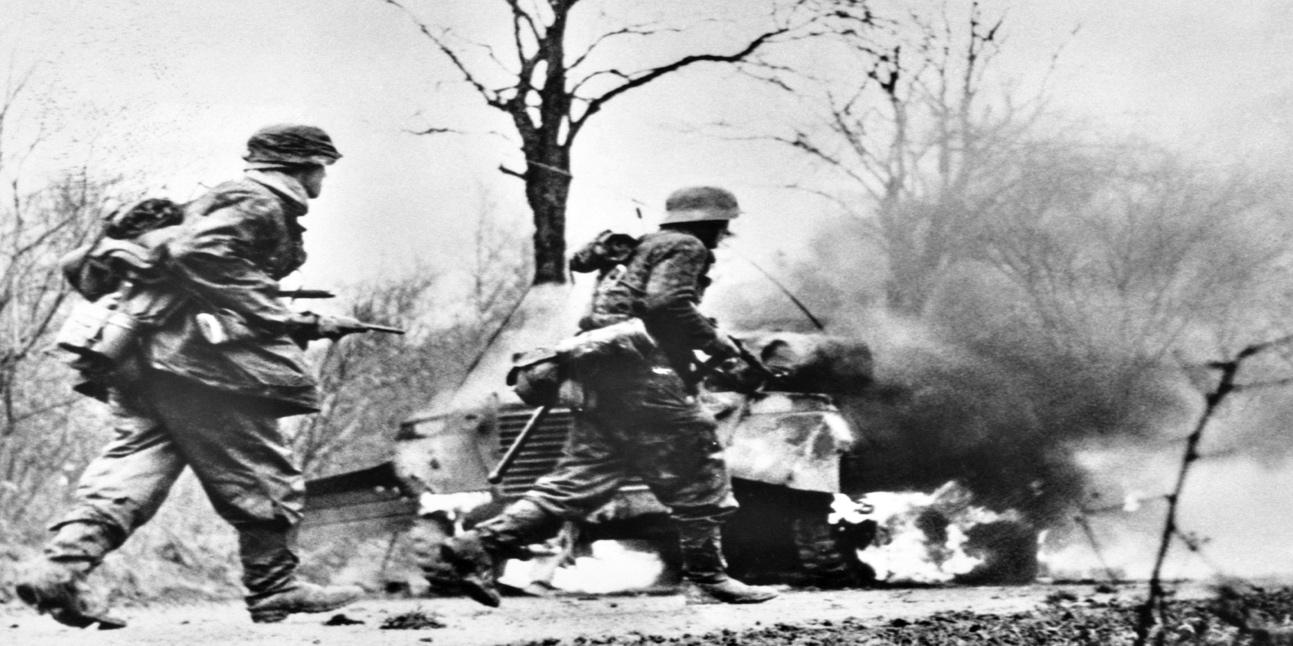
The Americans battled back heroically on many occasions, for example at Bastogne, but there were also cases of panic and confusion, and the danger would not be fully averted before the end of January 1945.[3] It was therefore decided to call once again on the unloved but useful Soviet partner.
Responding to an urgent American request, the Red Army unleashed a major offensive in Poland on January 12, 1945, one week earlier than originally planned.
Forced to face a new threat in the east, the Wehrmacht had to divert resources from its project in the Ardennes, thus relieving the pressure on the Americans.
But on the Eastern Front the Germans could not stop the Soviet steamroller, which forged ahead so quickly that in a few weeks it reached the banks of the Oder. In early February, the Soviets arrived in Frankfurt-on-the-Oder, a town situated less than one hundred kilometres from the German capital.
The Americans had reason to be grateful for the military favour rendered by Moscow, but they were far from happy that in the undeclared inter-Allied race to Berlin the Soviets had thus taken a huge lead over their Western partners, who had not even reached the banks of the Rhine and were still separated from Berlin by more than 500 kilometres.[4]
Already after the failure of Market garden, it became apparent to the American and British leaders that they would lose the race to Berlin and that the Red Army would eventually control the lion’s share of German territory, so that in keeping with precedents set by the liberators in Italy and elsewhere, the Soviets would be able to impose their will on post-war Germany.
This produced much pessimism, and doomsayers like General MacArthur, who opined in November 1944 that all of Europe would inevitably fall under Soviet hegemony, undoubtedly gained additional credibility at the time of the setback suffered in the Battle of the Bulge.[5] It was true that if military developments alone would be allowed to determine things, the eventual outcome would be very unfavourable to the Western Allies. However, the result might be different if the Soviets could be talked into agreements which would be binding regardless of military developments.[6]
Precisely this is what the British and the Americans hoped to achieve in a series of meetings with Soviet representatives in London in the fall of 1944. They proposed to divide Germany into three roughly equal occupation zones regardless of the position of each ally’s army at the end of the hostilities. (A fourth occupation zone would be assigned to the French much later.)
This arrangement was clearly in their own interest, but Stalin accepted the Western proposal. It was a major success for the BritishAmericans, which must have dumbfounded pessimists such as MacArthur. “In brief,” writes the American historian Gabriel Kolko, “the Russians agreed not to run Germany unilaterally despite every indication of an imminent military victory that would permit them to do so.”[7]
An additional unexpected bonus for the Western Allies turned out to be the fact that the Soviets also agreed that the capital, Berlin, like Germany as a whole, would be divided into three occupation zones, even though it was obvious that the Red Army would take the city and that Berlin would be situated deep in the occupation zone assigned to the USSR.
That a “West Berlin” could later exist in the heart of East Germany was due to the accommodating attitude displayed by Stalin in the fall of 1944 and again the successes of the Red Army and the Yalta Agreements during the winter of 1944-45.
Indeed, the London Agreements regarding the future occupation zones in Germany, and the agreements reached by the Big Three (Roosevelt, Churchill and Stalin) at the Yalta Conference between February 4 and 11, 1945, can be properly understood only from the perspective of the conundrum of the Western Allies at the time of the setbacks of their own armed forces and the simultaneous successes of the Red Army in 1944-45.
It has often been said that in the Crimean resort of Yalta the shrewd Stalin managed to dupe his Western colleagues, and above all President Roosevelt, who was already a very sick man at the time. Nothing could be further from the truth. First, it was the British and Americans who had nothing to lose, and everything to gain, from such a meeting. The reverse applied to the Soviets, who might arguably have been better off without this conference.
Indeed, the Red Army’s spectacular advance deep into the German heartland put more and more trumps into Stalin’s hands. On the eve of the conference General Zhukov stood on the banks of the Oder River, a mere stone’s throw from Berlin.
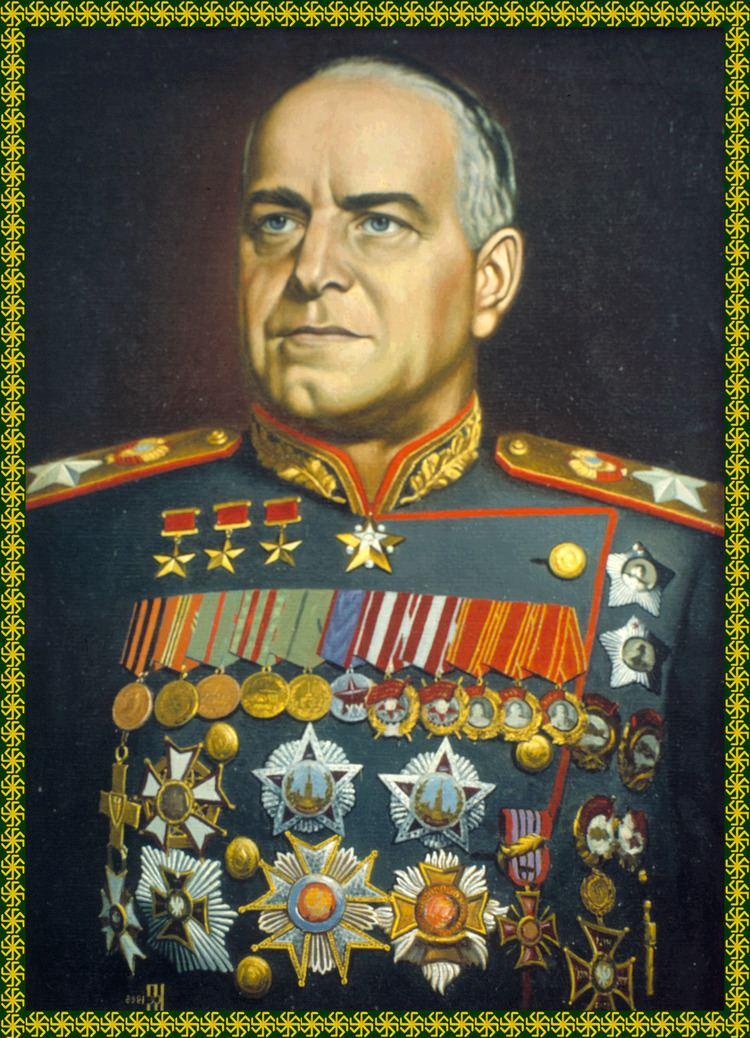
This is why Washington and London, and not Moscow, insisted on a meeting of the Allied leaders. Precisely because they were so desperate to meet Stalin in order to reach binding agreements, Roosevelt and Churchill also proved willing to accept his precondition for a conference, namely, that it be held in the USSR.
The American and British leaders had to undertake an inconveniently long voyage, allowing the Soviets a kind of “home-game advantage” during the tug-of-war that the conference promised to be. But these were minor imperfections compared to the advantages that a conference might bring and compared to the huge disadvantages certain to be associated with the anticipated occupation of most of Germany by the Red Army. Stalin had not needed or wanted a meeting of the Big Three at this stage of the war.
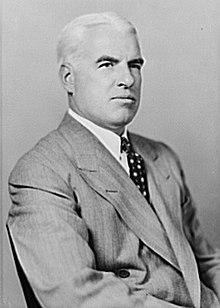
However, as we will soon see, he had reasons of his own for agreeing to hold such a conference, from which he of course also expected to derive certain advantages for the Soviet side, and he also had good reasons to reveal himself accommodating vis-à-vis his Western partners.[8]
Second, the agreements which eventually resulted from the Yalta Conference were indeed favourable to the Western Allies. Roosevelt’s secretary of state, Edward Stettinius Jr., who was present at the Crimean resort, later wrote that in this conference “the Soviet Union made more concessions to the [west] than were made to the Soviet Union.”[9]
And the American historian Carolyn Woods Eisenberg emphasizes that the U.S. delegation left Yalta “in an exultant spirit,” convinced that thanks to the reasonableness of the Soviets not only the Americans but mankind in its entirety had “won the first great victory of the peace.”[10]
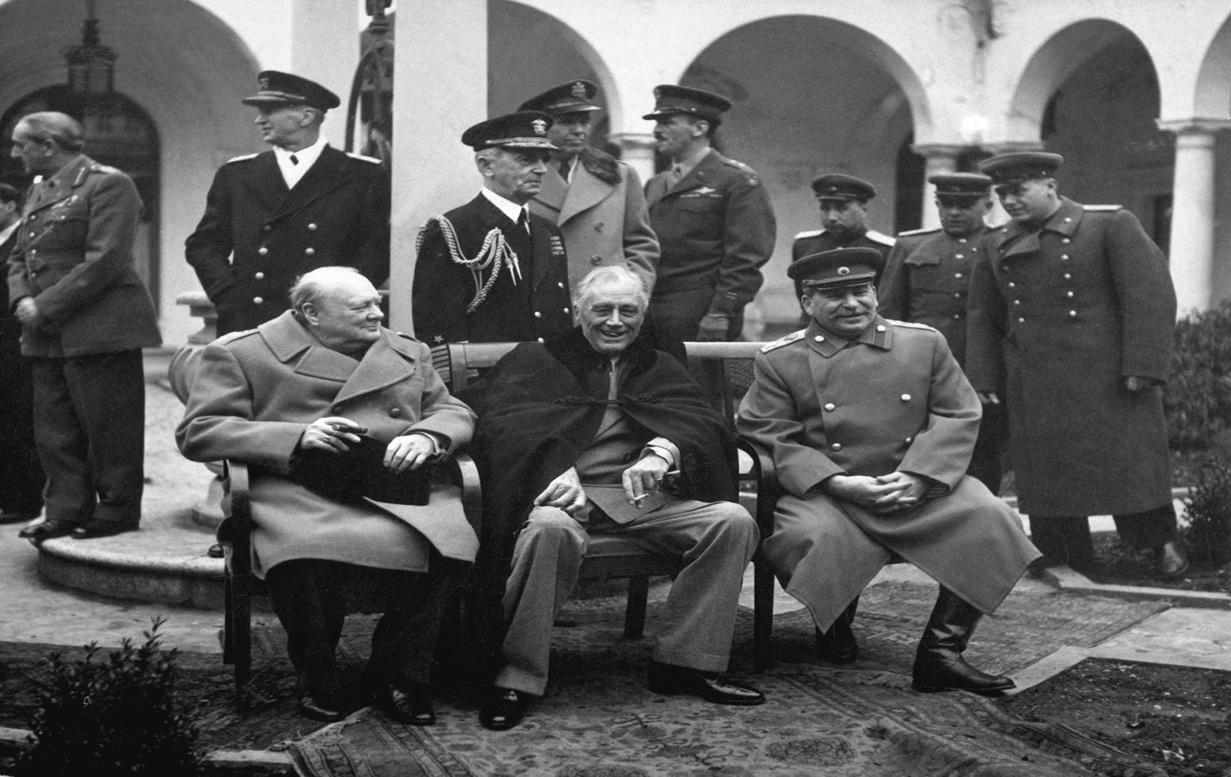
With regard to Germany, the London Agreements were officially confirmed in Yalta by the Big Three. As mentioned, the division of Germany into occupation zones was advantageous to the Americans and the British, because already in the fall of 1944 and even more so at the time of the Yalta Conference it appeared likely that the Red Army, which stood in Frankfurt-on-the-Oder in the east, might find itself in Frankfurt-on-the-Main in the West when the hostilities concluded.
Furthermore, the British and Americans were assigned the bigger and richer western part of Germany. It was also agreed in principle on the Crimean Peninsula that after the war Germany would have to make reparation payments, as had been the case after the First World War.
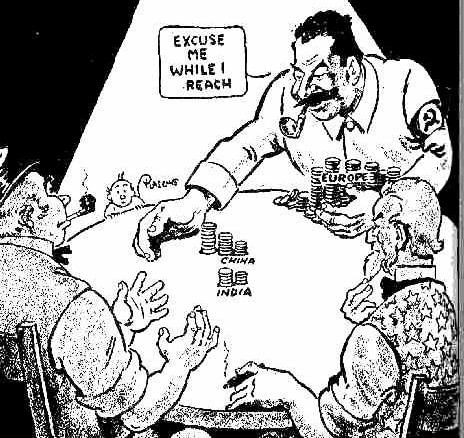
Both Roosevelt and Churchill found it justified and reasonable that half of these payments, then roughly estimated at 20 billion dollars, would go to the Soviet Union, where the Nazi vandals had conducted themselves in a particularly barbarous and destructive manner. (The amount of 10 billion dollars assigned to the USSR has been considered by some to be too high, but in reality it was “very moderate,” as the German historian Wilfried Loth has put it; a few years after the Yalta Conference, in 1947, the total war damage suffered by the Soviet Union was conservatively calculated at no less than 128 billion dollars.)
To Stalin, the issue of reparation payments was crucially important. It is very likely that he revealed himself to be so accommodating toward his Western partners regarding the division of Germany into occupation zones because he craved their cooperation in the matter of reparations.[11]
Conversely, to obtain the Soviet leader’s ratification of Germany’s division into occupation zones and his acceptance of other arrangements that were advantageous to themselves, the Americans and the British also indulged Stalin in some respects. In return for Stalin’s renewed commitment to eventually declare war on Japan, for example, Roosevelt offered American assent to the Soviet recuperation of the Far Eastern territories that czarist Russia had lost as a result of the Russian-Japanese War of 1904-05.[12]
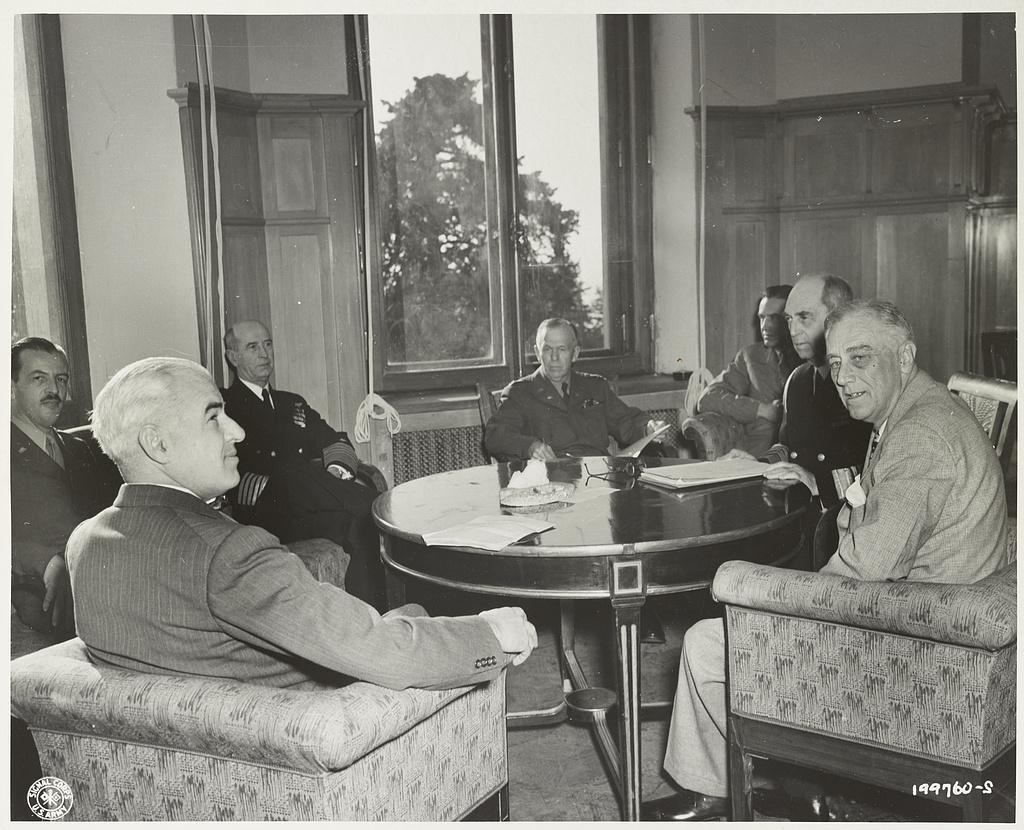
No definitive decisions for Germany’s future were arrived at in Yalta, even though particularly the Americans, and to a certain extent also the Soviets, showed some interest at the time in the widely publicized plan of the American secretary of the treasury, Henry Morgenthau.
Morgenthau reportedly proposed to solve the “German problem” by simply dismantling the country’s industry, thereby transforming Germany into a backward, poor, and therefore harmless agrarian state. In reality, this plan amounted to not much more than a rather vague and incoherent series of proposals, far less draconian than its opponents claimed and many Germans still believe.[13]
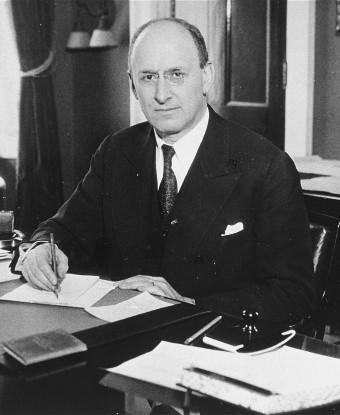
What was not properly realized at the time, neither in Washington nor in Moscow, was that not only major moral but also serious practical objections could be raised against the Morgenthau Plan.
For example, the plan could hardly be reconciled with the expectation that Germany was to pay huge reparations; this presupposed a certain measure of wealth, and for such wealth there was no room in Morgenthau’s scenario. “The logical inference of the Morgenthau Plan,” writes the German historian Jörg Fisch categorically, “was that there could be no question of reparations payments.”[14]
Moreover, as the American historian Carolyn Woods Eisenberg points out, Morgenthau’s plans for a “pastoralization” of Germany were totally “out of step with the thinking of the most important US . . . policy-makers,” who had good reasons for favouring the alternative option, “the economic reconstruction of Germany.”
Certain American politicians feared that the Plan would drive Germany into the arms of anarchy, chaos, and possibly Bolshevism. Businessmen realized that one would not be able to do any profitable business with a poor Germany.
And influential Americans worried about the possibly extremely negative implications of the Morgenthau Plan regarding the fate of Opel, Ford-Werke, and other highly-profitable German branch plants of American corporations.[15]
It was not a coincidence that precisely the representatives of firms with huge investments in Germany—such as Alfred P. Sloan, the influential chairman of the board of GM, the parent firm of Opel—were most categorically opposed to the Morgenthau Plan. (The Soviet ambassador to the U.S., Andrei Gromyko, was not far off the mark when he remarked that the opposition against the Morgenthau Plan was spearheaded by America’s “imperialist circles.”)
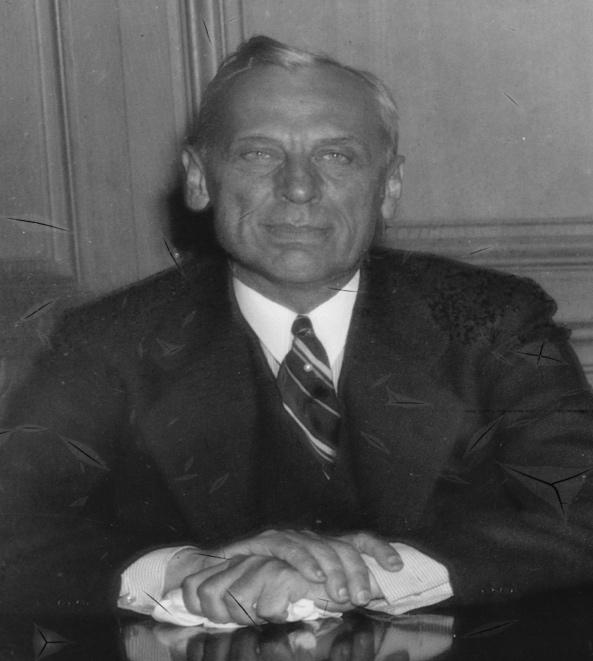
Alfred P. Sloan [Source: wikipedia.org] 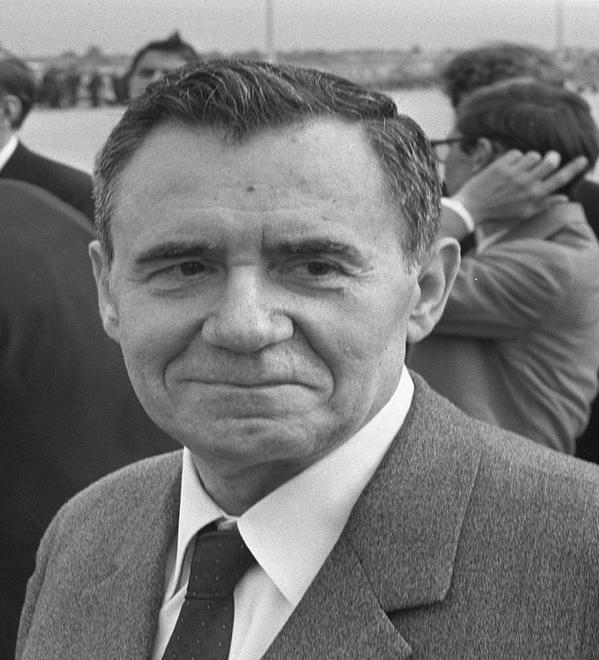
Andrey Gromyko [Source: wikipedia.org]
The Plan would thus gradually and quietly disappear from the scene during the months that followed the Yalta Conference. Morgenthau himself, a good friend of Roosevelt, would be dismissed from his high-ranking government position on July 5, 1945, by the new president, Truman.[16]
From the perspective of the Western Allies, then, the sometimes vaguely formulated agreements concluded in Yalta regarding Germany were important and advantageous. In addition, Stalin was prepared to discuss the future of the Eastern European countries liberated by the Red Army, such as Poland, even though the Big Three had never discussed the postwar fate of Western European countries such as France, Italy, and Belgium.
Stalin had no illusions regarding Western Europe, and he did not want to jeopardize the relationship with his British and American allies for the sake of countries that happened to be far away from the borders of the Soviet Union, the “socialist fatherland” whose survival and security had obsessed him since the beginning of his career.
With respect to Eastern Europe in general, however, and with Poland in particular, the situation was very different. The Soviet Union was keenly interested in the post-war makeup of neighbouring countries whose governments had formerly been unfriendly and sometimes totally hostile to the USSR, and whose territories formed the traditional invasion road to Moscow.
As for the postwar reorganization of Poland and other countries of Eastern Europe, Stalin had good reasons and, in the form of the Red Army’s presence in these countries, effective means to demand for the Soviet Union at least the same kind of input that the Americans and the British had permitted themselves in Western Europe.
Stalin had not challenged the Western Allies’ modus operandi in Western Europe; it may be supposed that he felt that it was now the turn of his Western partners to give him a free hand in Eastern Europe.[17]
In spite of all this, however, in Yalta Stalin was prepared to discuss the fate of Poland and the rest of Eastern Europe, even though the topic of Western Europe remained unmentioned. In addition, the actual Soviet demands turned out to be minimal and far from unreasonable, as Churchill and Roosevelt could hardly deny: the so-called Curzon Line should form the border between Poland and the Soviet Union (for which Poland would receive compensation in the form of German territory to the east of a line formed by the Oder and Neisse rivers) and no anti-Soviet regimes would be tolerated in Poland and other neighbouring states.[18]
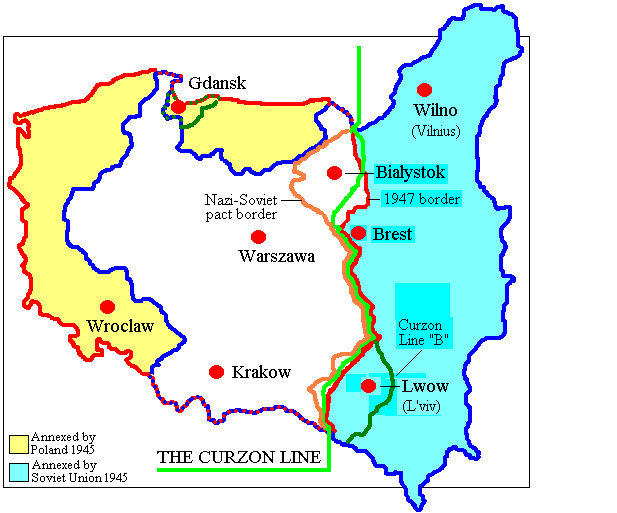
In return for their agreement to these demands, the Americans and the British received from Stalin what they wanted in the liberated countries of Eastern Europe, namely, no social and economic changes along communistic lines, free elections, and continuing input for themselves—together with the USSR, of course—In the future affairs of these countries.
This kind of formula was far from unrealistic, and variations of it were to be implemented successfully after the war in Finland and Austria.
The Yalta Agreements, then, did not award the Soviet Union the monopoly of influence in Eastern Europe, that is, the kind of exclusive influence that the Americans and the British already enjoyed, with Stalin’s silent approval, in Western Europe, even though they assigned “controlling influence” in Eastern Europe to the USSR.
The Yalta Agreements thus represented a considerable success for the Western Allies. It has often been said of Churchill that he had grave misgivings about the “concessions” that Roosevelt allegedly had made in the Crimean resort. In reality, he was totally euphoric when the conference ended,[19] and with good reason, since the British and Americans had fared far better at Yalta than they would have dared to hope when it started.
The allegation that in the Crimean resort the shrewd Stalin wrung all sorts of concessions from his Western colleagues is therefore totally false. It is true that afterwards the Yalta Agreements would not be properly implemented, for example regarding Poland and the rest of Eastern Europe. This had a lot to do with Stalin’s reaction to America’s “atomic diplomacy” of the summer of 1945, after the “nuking” of Hiroshima and Nagasaki, when Washington believed that it could impose its will on the presumably defenseless Soviets, and also with the irreconcilable, and totally unrealistic anti-Soviet attitude of the Polish government-in-exile in London.
The London Poles did not even want to recognize the Curzon Line as the future eastern border of their country, which had been acknowledged by Roosevelt and Churchill as both fair and inevitable, and which had been officially accepted in Yalta.[20]
Owing to the intractability of the London Poles, Stalin increasingly played the card of a communist and pro-Soviet Polish government-in-exile, the “Lublin Poles,” and this would eventually lead to the installation of an exclusively communist regime in Warsaw.
The Americans, like the British, would complain loudly about this, but their protest was hardly reconcilable with the uncontested fact that after the war they themselves would install or support dictatorial regimes in many countries, such as Greece, Turkey, and China, and that in those dictatorial client states they never insisted on the kind of free elections that they urged Stalin to organize in Poland and elsewhere in Eastern Europe.
Stalin was a realist. On the occasion of the London Agreements and the Yalta Conference he proved to be accommodating vis-à-vis Churchill and Roosevelt not because he wanted to be so, but because he correctly calculated that he could hardly afford not to be.
The war in which the USSR had suffered grievously and had just barely escaped total obliteration was not yet over. The Soviets’ military situation in early 1945 was excellent, of course, but all sorts of disagreeable things could still come to pass. As the end approached for the Third Reich, for example, the propaganda machine of Goebbels aggressively pursued an ultimate rescue scenario for the Nazi state, namely, the project of a separate armistice between Germany and the Western Allies, followed by a common crusade against the Bolshevik Soviet Union.
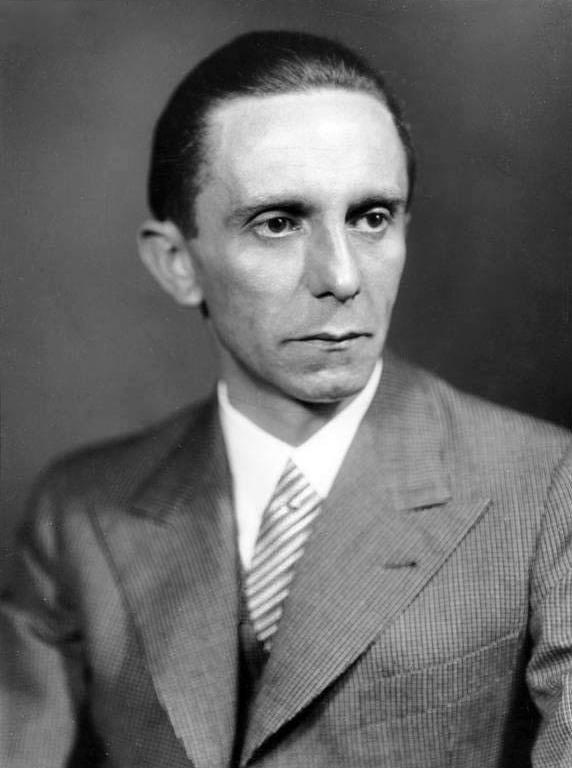
This plan was not nearly as naive and unrealistic as one might assume, because Goebbels knew only too well that leading circles in Great Britain and virtually everywhere else in the Western world had considered Bolshevism as the “natural” enemy, and simultaneously viewed Nazi Germany as the spearhead in the coming anti-Soviet crusade.
The Nazi propaganda minister was also keenly aware that during the war quite a few Western leaders found the Soviets a useful ally but continued to despise the communist state and were determined to eliminate it sooner or later.
As for the USSR, all this meant that after years of superhuman efforts and huge losses, when victory seemed tantalizingly near, the order of the day continued to be survival—the survival of the country and the survival of “socialism in one country,” which had always been Stalin’s great obsession.
The Soviet leader worried about Goebbels’ scenario, and not without reason. In the camp of the Western Allies several leading personalities, generals as well as statesmen, found this scenario quite attractive. After the war some of them would openly express regret that the American and British armies had not continued to march eastward in 1945, preferably all the way to Moscow.
Churchill himself flirted with the thought of this kind of initiative and actually ordered preparations to be made for what was codenamed Operation Unthinkable.[21]
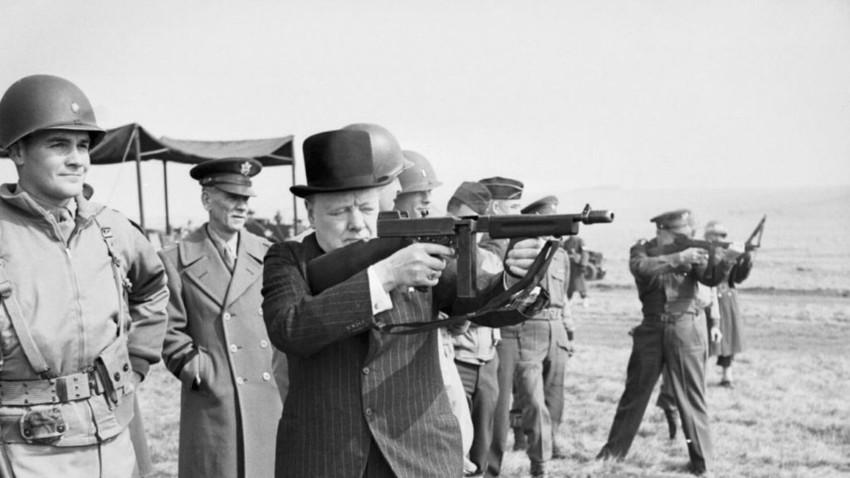
Stalin harboured no illusions with respect to the true Western feelings for the Soviet Union. His diplomats and spies kept him well-informed about opinions and developments in London, Washington, and elsewhere.
For the Soviet leader, who remembered the historical precedent of the Allied intervention in the Russian Civil War, the possibility of a reversal of alliances, a combined German-Western undertaking against the Soviet Union, constituted a genuine nightmare. He tried to exorcize it by not giving Churchill and Roosevelt the slightest excuse to undertake something against the USSR.
Thus it becomes possible to understand why he refrained from criticizing their conduct in Western Europe and in Greece, and why he revealed himself to be so accommodating at Yalta.[22] In any event, in Yalta in February 1945, Roosevelt and Churchill did not indulge Stalin, to the contrary, the Soviet leader indulged his “Anglo-Saxon” counterparts.

-
Diane Shaver-Clemens, Yalta (New York: Oxford University Press, 1971) quoted in Jeremy Kuzmarov and John Marciano, The Russians are Coming, Again: The First Cold War as Tragedy, the Second as Farce (New York: Monthly Review Press, 2018), 65. ↑
-
Alvin Finkel and Clement Leibovitz, The Chamberlain-Hitler Collusion (Toronto: Lorimer Publishers, 1997), p. 206; Dpmrovp Losurdo Stalin: Storia e critica di una leggenda nera (Rome: Carocci Editori, 2008., pp. 179–180. ↑
-
Philip Knightley, The First Casualty (Baltimore: The Johns Hopkins University Press, 2002), pp. 324–25; Helen Keyssar and Vladimir Pozner, Remembering War: A U.S.-Soviet Dialogue (New York: Oxford University Press, 1990) p. 153. ↑
-
Richard Overy, Why the Allies Won (New York: W.W. Norton, 1997), pp. 256–60; Gabriel Kolko, The Politics of War: The World and United States Foreign Policy, 1943-1945 (New York: Random house, 1968), pp. 350–52; Robert J. Maddox, The United States and World War II (Boulder, CO: Westview Press, 1992), pp. 250–51; Keyssar and Pozner, Remembering War, p. 154. ↑
-
MacArthur’s opinion is cited in Erich Schwinge, Bilanz der Kriegsgeneration (Munich: Universitas, 1997), pp. 10–11. ↑
-
Edward M. Bennett, Franklin D. Roosevelt and the Search for Victory: American-Soviet Relations, 1939–1945, (Wilmington, DE: Scholarly Resources, 1990), p. 156. ↑
-
Rolf Steininger, Deutsche Geschichte 1945–1961: Darstellung und Dokumente in zwei
Bänden. Vol. 1 (Frankfurt-am-Main: Fischer Taschenbuch Verlag, 1983), pp. 20–22; Kolko, The Politics of War, pp. 353–55, quotation from p. 355. ↑
-
Fraser J. Harbutt, The Iron Curtain: Churchill, America, and the Origins of the Cold War (New York and Oxford: Oxford University Press, 1986), p. 82. ↑
-
Stettinius quotation from Michael Parenti, The Anti-Communist Impulse (New York Random House: 1969), p. 131. ↑
-
Carolyn Eisenberg, The American Decision to Divide Germany, 1943-1949 (New York: Cambridge University Press, 1996), p. 61. ↑
-
Wilfried Loth, Stalins ungeliebtes Kind: Warum Moskau die DDR nicht wollte (Berlin:, Rowohlt, 1994), pp. 14-15; Steininger, Deutsche Geschichte 1945–1961: Darstellung und Dokumente in zwei Bänden. p. 28. ↑
-
Francis L. Loewenheim, Harold D. Langley, and Manfred Jonas (eds.), Roosevelt and Churchill: Their Secret Wartime Correspondence (New York: Saturday Review Press, 1975), p. 656. ↑
-
Harbutt, The Iron Curtain: Churchill, America, and the Origins of the Cold War, p. 72; Loth, Stalins ungeliebtes Kind: Warum Moskau die DDR nicht wollte, p. 18; Michaela Hoenicke, “Das nationalsozialistische Deutschland und die Vereinigten Staaten von Amerika (1933–1945),” in Klaus Larres and Torsten Oppelland (eds.), Deutschland und die USA im 20. Jahrhundert: Geschichte der politischen Beziehungen (Darmstadt: Wissenschaftliche Buchgesellschaft, 1997), p. 293 ff.; Wolfgang Krieger, “Die amerikanische Deutschlandplanung, Hypotheken und Chancen für einen Neuanfang,” in Hans-Erich Volkmann (ed.), Ende des Dritten Reiches — Ende des Zweiten Weltkriegs: Eine perspektivische Ruckschau (Munich and Zurich: Piper, 1995), pp. 36, 40–41; Kolko, The Politics of War, pp. 331,
348–49; Werner Link, Deutsche und amerikanische Gewerkschaften und Geschäftsleute 1945–
1975: Eine Studie uber transnationale Beziehungen (Düsseldorf: Droste, 1978), pp. 107–08; Lloyd C. Gardner, Architects of Illusion: Men and Ideas in American Foreign Policy
1941–1949 (Chicago: Quadrangle Books, 1970), pp. 250–51. ↑
-
Jörg Fisch, Reparationen nach dem Zweiten Weltkrieg (Munich: Beck, 1992), p. 48. ↑
-
Jacques R. Pauwels, Big business and Hitler (Toronto: Lorimer, 2017). ↑
-
Eisenberg, The American Decision to Divide Germany, 1943-1949, p. 26; Gromyko’s comment is from Hoenicke, “Das nationalsozialistische Deutschland und die Vereinigten Staaten von Amerika (1933–1945),” p.
302. ↑
-
Parenti The Anti-Communist Impulse, p. 135; Bert Cochran, The War System (New York: Macmillan, 1965), p. 42. ↑
-
Parenti, The Anti-Communist Impulse, p. 137. ↑
-
Gerhard L. Weinberg, A World at Arms: A Global History of World War II
(Cambridge: Cambridge University Press, 1994), p. 809; Jost Düllfer, Jalta, 4. Februar 1945: Der Zweite Weltkrieg und die Entstehung der
bipolaren Welt (Munich: Drutscher Taschenbuch-Verlag, 1998), p. 29. ↑
-
Parenti, The Anti-Communist Impulse, p. 139. ↑
-
“Operation Unthinkable,” https://en.wikipedia.org/wiki/Operation_Unthinkable. ↑
-
John Lewis Gaddis, The United States and the Origins of the Cold War 1941–1947
(New York and London: Columbia University Press, 1972), p. 88; Christopher Simpson, The Splendid Blond Beast: Money, Law, and Genocide in the Twentieth Century (New York: Grove Press, 1993), pp. 118–19; Loth, Stalins ungeliebtes Kind: Warum Moskau die DDR nicht wollte, p.16. ↑
CovertAction Magazine is made possible by subscriptions, orders and donations from readers like you.
Blow the Whistle on U.S. Imperialism
Click the whistle and donate
When you donate to CovertAction Magazine, you are supporting investigative journalism. Your contributions go directly to supporting the development, production, editing, and dissemination of the Magazine.
CovertAction Magazine does not receive corporate or government sponsorship. Yet, we hold a steadfast commitment to providing compensation for writers, editorial and technical support. Your support helps facilitate this compensation as well as increase the caliber of this work.
Please make a donation by clicking on the donate logo above and enter the amount and your credit or debit card information.
CovertAction Institute, Inc. (CAI) is a 501(c)(3) non-profit organization and your gift is tax-deductible for federal income purposes. CAI’s tax-exempt ID number is 87-2461683.
We sincerely thank you for your support.
Disclaimer: The contents of this article are the sole responsibility of the author(s). CovertAction Institute, Inc. (CAI), including its Board of Directors (BD), Editorial Board (EB), Advisory Board (AB), staff, volunteers and its projects (including CovertAction Magazine) are not responsible for any inaccurate or incorrect statement in this article. This article also does not necessarily represent the views the BD, the EB, the AB, staff, volunteers, or any members of its projects.
Differing viewpoints: CAM publishes articles with differing viewpoints in an effort to nurture vibrant debate and thoughtful critical analysis. Feel free to comment on the articles in the comment section and/or send your letters to the Editors, which we will publish in the Letters column.
Copyrighted Material: This web site may contain copyrighted material the use of which has not always been specifically authorized by the copyright owner. As a not-for-profit charitable organization incorporated in the State of New York, we are making such material available in an effort to advance the understanding of humanity’s problems and hopefully to help find solutions for those problems. We believe this constitutes a ‘fair use’ of any such copyrighted material as provided for in section 107 of the US Copyright Law. You can read more about ‘fair use’ and US Copyright Law at the Legal Information Institute of Cornell Law School.
Republishing: CovertAction Magazine (CAM) grants permission to cross-post CAM articles on not-for-profit community internet sites as long as the source is acknowledged together with a hyperlink to the original CovertAction Magazine article. Also, kindly let us know at info@CovertActionMagazine.com. For publication of CAM articles in print or other forms including commercial internet sites, contact: info@CovertActionMagazine.com.
By using this site, you agree to these terms above.
About the Author

Jeremy Kuzmarov is Managing Editor of CovertAction Magazine.
He is the author of four books on U.S. foreign policy, including Obama’s Unending Wars (Clarity Press, 2019) and The Russians Are Coming, Again, with John Marciano (Monthly Review Press, 2018).
Jeremy can be reached at jkuzmarov2@gmail.com.

Jacques Pauwels holds PhDs in history (York University) and political science (University of Toronto) and has taught history at numerous universities in Ontario, Canada.
He is author of books on Nazi Germany, World Wars I and II, the French Revolution, and the origins and meaning of the names of peoples and places.
Jacques can be reached at jackpauwels@yahoo.ca.

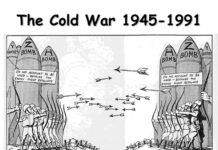
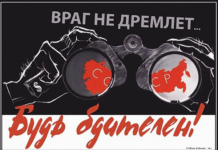
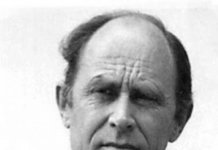
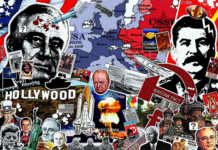
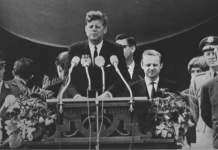
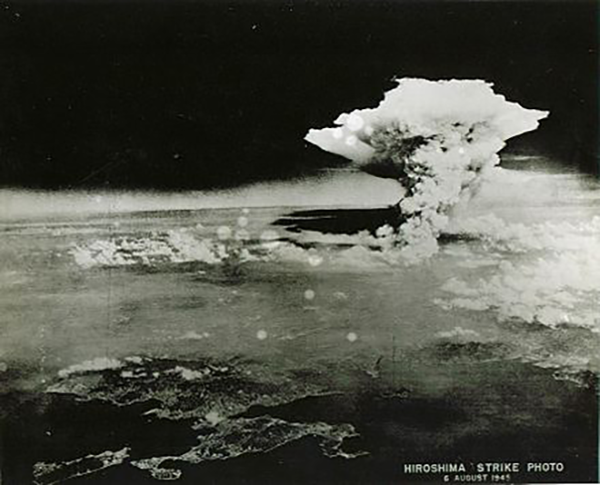
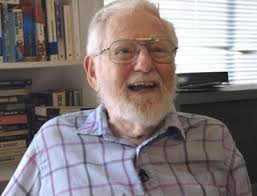

Mar 2, 2022 3rd March 1918: Treaty of Brest-Litovsk signed between Russia and the Central Powers
By the winter of 1917 the Russian economy was in tatters as a result of the strain of maintaining the war effort. Tsar Nicholas II had abdicated in February, and the subsequent Provisional Government was overthrown in the Bolshevik Revolution later that year after they continued to fight alongside the Entente Powers.
https://youtu.be/UIcINLL0COk
[…] Mississippi Senator, Roger Wicker, the second highest Republican on the Senate Armed Services Committee, went so far as to suggest in an interview with Fox News that the U.S. should not rule out a preemptive nuclear strike on Russia if it invaded Ukraine. […] Seventy-Seven Years Ago, U.S. and Russia Signed Historic Agreement at Yalta […]
[…] Bu makalenin asıl kaynağı CovertAction Dergisi’dir. […]
Splendid article. I was looking into the post war politics in Italy and Yalta came to mind as a precipitator of the outcome. This piece offered a disclaimer and some compelling hints as to the reasons for the developments. After 1945 every village, town and city in Italy had Communist Mayors and yet never a national Communist president. My 94 year old barber, from Ripacondida said Togliatti went to Russia. The comment was correct but did not provide a total answer. Reading between the lines will be our sport for some time to come.
At a glance the article confirms the opinion of Stephen Kotkin that Stalin was very generous. The settlement with the Finns after the war must have had some input that the Soviet archives did not reveal. The USSR could have had a port in addition to Tallin and a western border deep into Scandinavia.
I can only hope the answers to all the questions the current scholarship raises will be revealed in the next 40 years.
[…] Seventy-Seven Years Ago, U.S. and Russia Signed Historic Agreement at Yalta, by J Kuzmarov and J Pau… […]
Dr Robert Malone on posted irrefutable proof of the Ivermectin success story in India. Ivermectin needs to be allowed for medical use and for doctors to prescribe it immediately in United States. It is an act of criminal malfeasance to keep up the sham in the face of overwhelming proof and overwhelming harm to the people of this nation. If you want you can get it from ivmcures.com
Your comment is not relevant to this article and stop peddling nonsense.
Excellent article, thank you. We read, ‘we would do well to remember FDR’s visionary leadership and pursuit of diplomacy.’ However, we would also do well to remember FDR’s visionary words as an experienced politicians: ‘no war is an accident; if war breaks out, it means the fighting parties agreed to the war.” This was true 77 years ago as it is today.
Otherwise, we have to think that all politicians are stupid and ignorant. The amount of money governments in Diplomacy is colossal. Imagine all those Embassies the world over. Not only the buildings themselves and the Ambassador, but staffing them and running the whole operation. All of this is for the purpose of the appointed Ambassador to making negotiate on behalf of his Government, not to oppose them.
That is, if Russia and USA want to play war over the chosen battlefield Ukraine, all three countries have to agree to the slaughter. And diplomats are there to ensure the slaughter happens. However, why are they called diplomats? because they are trained in the Art of pretending, feigning, lying. The successful ‘diplomat’ is the one that makes you take his lies for truths.
The US Ambassador in Iraq in the last months of Saddam Hussein negotiated every detail of the American/British invasion with the Iraqi Government, foreign Affairs and Defense Ministers included. To the last detail: commencement date, hour, who shoots the first shot, etc. The accomplice Media had time to quitly prepare themselves, look for the right hotels, the right positions for cameras, etc.
The talks that go on now, remind me of the talks in Rambouillet, France, before the Kosovo war. After every ‘diplomatic’ meeting, the spokesman held a Press Conference, telling reporters about the ‘progress’ of negotiations to ‘avoid’ war, whilst in the room where journalists were not allowed in, the same details as for Iraq were been given the final touches. Then, when the tragic day arrived, the spokesman comes out and the hypocrit solemny declares to the world “sorry folks, negotiations failed’.
This tragic comedy will go on forever, as long as humanity thinks we need Armed Forces. Any of us, if we love Peace and Justice, will also be organizing Games of War, if we were in important Government positions. Governments’ No.1 duty is the success of its military industry, for a variety of reasons l have no time to detail now.